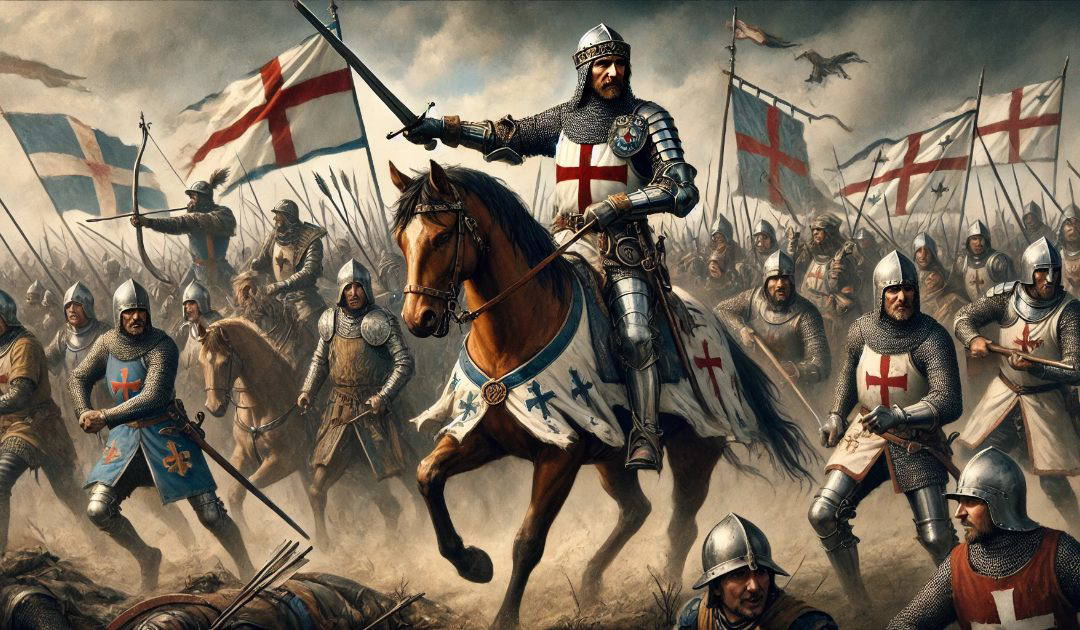On the 11th of March, 1387, the English mercenary, John Hawkwood, led Padua to victory over Verona in the Battle of Castagnaro. John Hawkwood (c. 1320 – 1394) was one of the most famous and formidable English mercenaries of the 14th century. Known in Italy as Giovanni Acuto, he made his name as a condottiero (a mercenary captain) during the chaotic period of Italian warfare. His military skill, strategic brilliance, and political savvy earned him wealth, power, and a lasting legacy in Renaissance Italy.
John Hawkwood was probably born around 1320 in Essex, England, the son of a tanner. His early life is obscure, but he may have received some education and possibly served as an apprentice before taking up arms.
He first emerged as a soldier during the Hundred Years’ War (1337 – 1453) between England and France, possibly serving under Edward III. I suppose Hundred Years’ War is catchier than Hundred and Sixteen Years’ War. Sir Anthony Standen’s adventures were during the Eighty Year’s War, which was much closer to eighty years in duration. Hawkwood fought at major battles like Crécy (1346) and Poitiers (1356), where English forces decisively defeated the French. These experiences shaped him into a skilled tactician.
After the Treaty of Brétigny (1360) temporarily halted the war, many English soldiers found themselves unemployed. Instead of returning home, Hawkwood joined the White Company, a notorious band of mercenaries that roamed France and later Italy, offering their services to the highest bidder.
By the 1360s, Italy was a fractured land of warring city-states, Florence, Milan, Venice, the Papal States, and smaller duchies. Wealthy but militarily weak, these states relied on mercenary armies, giving rise to the profession of the condottieri (mercenary captains).
Hawkwood arrived in Italy leading the White Company, a brutal and highly disciplined force of mainly English and German mercenaries. His use of longbowmen and dismounted cavalry tactics, learned from English warfare, gave him a tactical advantage over traditional Italian armies.
He quickly gained fame and fortune, fighting for powerful states such as:
- Pope Gregory XI and the Papal States – He served as a captain for the Papacy, protecting its interests against rebellious Italian lords.
- Milan and Florence – Rival powers that frequently hired him, sometimes against each other.
- The Free Companies – He occasionally led independent campaigns of plunder and conquest.
Despite being a mercenary, Hawkwood was also a skilled diplomat, shifting allegiances carefully to maintain his influence. His reputation for loyalty, rare among condottieri, made him a sought-after leader.
By the late 1370s, Hawkwood had become closely aligned with Florence, one of the most powerful republics in Italy. The Florentines viewed him as a valuable military asset, and in 1381, they granted him a large estate in Tuscany, effectively making him a noble.
During his years in Florence, Hawkwood led campaigns against Milan and other rivals. He often used scorched-earth tactics, burning crops and pillaging villages to weaken his enemies. Despite his ruthless methods, he remained respected by his employers.
In his final years, he retired from active campaigning but remained in Florence, where he was honoured as a commander and advisor. The Florentines even considered making him the head of their army permanently, a rare honour for a foreigner.
John Hawkwood died in 1394, probably in Florence. His funeral was lavish, and the city honoured him with a grand fresco in the Florence Cathedral (Duomo), painted by Paolo Uccello in the early 15th century. Hawkwood was more than just a mercenary, he was a military innovator, a master of strategy, and a respected leader. His career reflected the complex world of Renaissance warfare, where power often depended on the skill of hired swords. Though he never ruled a state, his wealth, influence, and reputation secured him a unique place in Italian history, making him one of the most famous condottieri of the Middle Ages.

